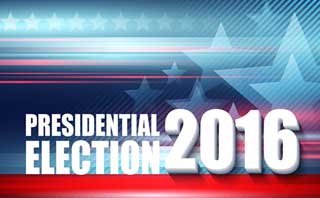The Word from Lansing: Calling for Dignity in the Public Square

Posted October 14, 2016
With a few weeks left in the election, campaign coverage is ever present: in conversations at work, on televisions at the gym, and all over Facebook newsfeeds. This election has left many voters fatigued, as campaigning began over a year ago. Others have expressed dissatisfaction with the candidates for the nation’s highest office, citing issues of trustworthiness, integrity, character, and experience.
The choice of candidates and feelings of “political homelessness,” the negativity, the research needed for decisions, or a combination of these reasons makes it easier to step away from the political process altogether. For some, retreating from this election is particularly tempting. Yet Pope Francis, among others, has called for continued engagement at all levels of government. Why?
Because people of faith, in following the example of the Gospel, have a duty to pursue the common good and leave the world better than it was before (Evangelii Gaudium). Voting and advocacy help us live out this duty, as politics is responsible for “the just ordering of society and of the state.” On November 8, we will elect members of the U.S. House of Representatives, the Michigan House of Representatives, the State Board of Education, the Michigan Supreme Court, and other local offices. Instead of letting frustration with the presidential race take over, Catholics can and still should head to the ballot box.
Through charitable works and overall concern for the human condition, the Catholic Church and people of faith have long served the most vulnerable and marginalized of society. In politics too, Catholics can highlight and work within this “field hospital,” ensuring the vulnerable and efforts to promote the common good are heard by elected officials (Pope Francis at Casa Santa Marta, 2015).
Setting partisanship and rhetoric aside, a focus on individual conscience formation and attention to critical issues will help Catholics choose their preferred candidates at all levels of government. Voters benefit from asking questions such as: Which values are most important and how can they be promoted? How can we uphold the dignity of all in society, especially the unborn? What should society look like? Which candidates at the local, state, and federal level will help reach that vision for society while protecting the most vulnerable in our midst?
In an effort to assist with these questions, the U.S. bishops write in Forming Consciences for Faithful Citizenship that Catholics should consider candidate positions on issues of human life and dignity, children and families, religious freedom, poverty, health care, immigration, education, and restorative justice, among other issues. The bishops urge people of faith to weigh all these issues carefully while recognizing that they are not all morally equivalent. According to the document, “the direct and intentional destruction of innocent human life…is always wrong and is not just one issue among many. It must be opposed.”
With these thoughts in mind, help shape the policies that will be debated and pursued by voting on Tuesday, November 8. Michigan Catholic Conference (MCC) offers materials to help prepare Catholics for the upcoming elections, including information to assist in conscience formation, candidate evaluation, political guidelines for parishes, and Election Day logistics at www.micatholic.org/2016election [Link no longer available —Ed.].
It is important to remember that the work does not end when votes are recorded. Regardless of which candidates win, at all levels of the ballot, Catholics can communicate with their elected officials, making an effort to shape the dialogue and to create a more just society.
Through this election and the months to come, may the desire to advance the common good provide motivation for individuals to be engaged in the public realm. In spite of the urge to retreat, now is really the time to make our voices heard.
